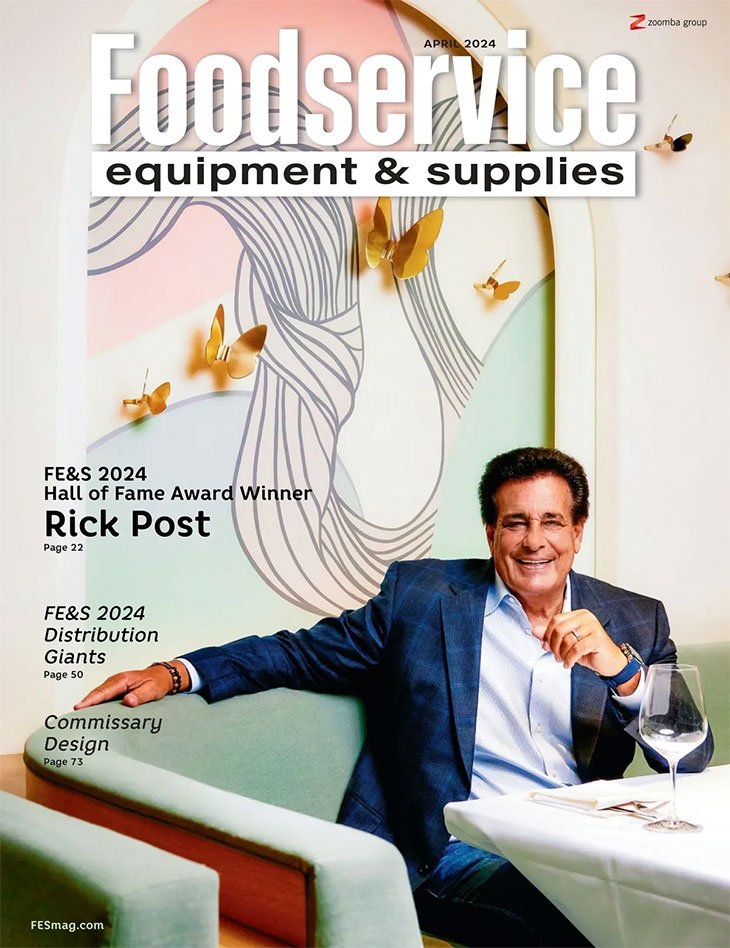Operational Issues
Quaker Steak & Lube's Miller says bars must be designed to be functional. And that's why the chain prefers to have one service station that supports the waitstaff and another to cater to bar guests. The layout of the beer taps, glass frosters, bottle coolers and point of sale items all limit the crossover of the bartender and make it easy to work, pour and stock.
A great beer system is essential, Miller says. Also there must be enough glass frosters to supply sufficient cold glasses. Plenty of bottle coolers are necessary, too. Miller says Quaker Steak & Lube uses slide-top as well as glass door coolers that serve double duty as merchandisers that help display what is available. Having plenty of bottle speed rails for easy access and storage of the liquors is also needed to allow the creation of the latest drink recipes.
For Chili's, Long says one significant operational issue centers on smoking versus non-smoking areas. "If the municipality where our restaurants are located is not smoke-free, there are different design considerations," he explains.
Tap beer sales are a growing segment of the Chili's bar business, according to Long. Keg storage space can be an issue due to the ratio of back-up kegs needed. The normal ratio tends to be 1.5 times the tapped kegs. The staple bar equipment has not changed, Long says, but recent trends are "frost rails" to keep drinks cold and "frosted" taps for a variety of tequilas.
Operations in the new Bennigan's bar are more efficient now, as are those in the back of the house. Mangiamele says all operations have been designed to be more effective in the smaller footprints. Space-saving equipment in the back of the house makes it possible for much smaller space for prep, cooking and dishwashing.
Bar Programs Add Zest — and Margins
There are many creative bar programs to increase business and revenues, as well. These range from signature drinks to special pairing promotions.
Buffalo Wild Wings upped its game with a signature beer. The bar's concept has always been focused on "wings, beer, sports" and now beer has been given the same status as the other two. This summer, the brand introduced Game Changer, a pale ale designed and brewed by Redhook Brewery and exclusive to the chain. Buffalo Wild Wings pairs Game Changer with wings and customers consume both while watching the 50-plus TV screens in any of the 925 locations around the country.
In an article written by Technomic's Crecca, she says of Game Changer: "The pale ale designed by Redhook Brewery is aptly named, as it not only relates to the beer's intended purpose as a brew to pair with eating wings while watching sports on the 50 or so screens found in any Buffalo Wild Wings, but also it changes the way restaurant operators and adult beverage suppliers work together."
Christine LaFave Grace, an associate editor at Technomic, recently covered another trend in a blog post titled "Jars at the Bar." Referring to drinks served in Mason jars, she says, "For on-premise operators, the presentation of a cocktail in a jar can suggest a very contemporary kind of simplicity. A Mason jar connotes a back-porch kind of cocktail — something that isn't meant to be taken too seriously."
Grace adds that the jars provide an attractive value proposition to guests: their size. They are often 16 ounces. This also means that the restaurant can charge a higher price for them. She also points out that the ridged lips of the jars don't make for easy sipping. Some operators serve the drinks with a glass on the side for decanting.
Like many chains, Bennigan's has a specialty drink program. While there used to be a list of 42 cocktails, there are now 14 but the menu for specialty drinks is refreshed frequently. The choices are listed on a green wine bottle that is placed on each table. The larger list was too confusing, Mangiemele says. People were ordering their default choices instead of trying something new.
Bennigan's has created the new Bennigan's on the Fly — a smaller fast-casual concept for airports, cruise ships and the like — to increase distribution points. When possible, Bennigan's will adapt adult beverages for this new venue. Mangiamele says the new fast-casual locations have alcohol where licenses permit.
Bennigan's, on a rapid growth curve, has expanded internationally, as well. In Muslim countries where alcohol is banned, they serve "mocktails" that are primarily smoothies. This still provides the bar experience without breaking any laws or local customs.
Long says that Chili's uses drink and food specials to great advantage, too. He points out that this is a great way to introduce and test new offerings.
Crecca provides examples of chains that have done a great job of making happy hours happier. Bonefish Grill, for instance, has handcrafted cocktails at specialty prices and a list that features $5 drinks. Fleming's Prime Steakhouse & Wine Bar has a bar menu and cocktail program that features "5 for $6 'til 7". Patrons choose from five appetizers, five cocktails or five wines, each for $6. Fleming's also offers "Bar la Carte," a menu that allows guests to dine at the bar.
Pitfalls to Avoid
One pitfall to avoid, according to Long, includes making the bar top and the overall bar area too small. If they are too small, it has a psychological effect: guests feel uncomfortable when they approach. Additionally, keeping clear lines of sight to the TVs from all vantage points of the bar is important. He suggests that having taller ceilings or removing a low-hanging ceiling to expose the structure in order to add volume to the space.
Mangiamele stresses that it is not wise to ignore the demands of the specific region. "You have to be sensitive to local tastes," he says. Bennigan's "makes it local" with signage. The unit in Tyson's Corner, Va., has a large "Tyson's Corner" sign. In Dallas, it' a "Dallas" sign. This makes the unit have a local feel, plus creates an emotional connection to the brand.
Quaker Steak & Lube's Miller advises keeping bars simple, well equipped, flexible for change and easy to clean. He recommends under counter lighting, floor drains, a place for trash and recycling and having as much equipment on casters as possible.
Ground Round's Crawford adds that it's important to have a responsible beverage service program in place. "All bar employees need to be suitably trained, even more so than dining room staff," he says.
Bar Biz Pays Off
The benefits of a strong bar program are multiple. "Both traffic and profits go hand-in-hand," says Long.
Mangiamele agrees. "Bar business is critical to our revenues," he says. Food accounts for about 75 percent of the chain's sales, so the bar share is important. He adds, "Market share is more precious nowadays. There is no option not to perform." He and his team are enjoying the challenge. "We're having the time of our lives, both domestically and internationally," he says.
Adult beverage sales are critical to many concepts and, as a number of chains attest, are increasing both traffic and revenues. For example, Technomic's most recent report created by its Adult Beverage Practice finds that among the Top 50 full-service casual dining chains, adult beverages account for 17 percent of sales. Crecca says this research is on par with sports-focused concepts, like Buffalo Wild Wings, which are in the 20 percent to 25 percent range. Concepts like Tilted Kilt (at 40 percent) and Hooters' (at 25 percent to 30 percent) run higher. Beer-focused concepts, she says, run in the 30 percent range. Crecca also points out that, as check averages rise, as in steakhouse chains, so does the percent of sales from alcohol. With results like these, it's plain to see that more chains will continue to emphasize their bar business in the near future as they look to drive more profitable sales. FE&S




